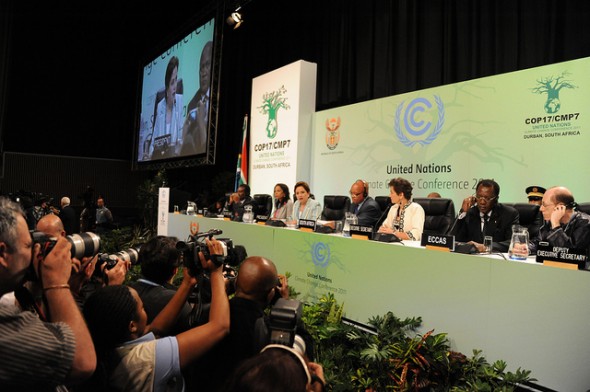Deputy Supervisor Frongillo represents the Town of Caroline at U.N. climate talks
Dispatch from South Africa climate negotiations
Dear Friends and Colleagues,
I am writing from a village in rural Kwazulu-Natal, South Africa.
It’s a sunny and windy day, chickens pecking in the grass amid thatched huts and farm plots. To the west are the rolling foothills of the dramatic Drakensberg Mountains.
The fast-paced U.N. climate negotiations seem a world away. I left Durban late yesterday, as high-level government ministersfrom 190 counties made last-minute compromises on a global climate deal.
Highlights:
– Climate talks near deadlock
– U.S. youth ejected for statement
– Press briefing on hydraulic fracturing
– Fracking is “the next Tar Sands”
– Traveling in South Africa
Climate Talks Near Deadlock
As the international climate talks wind down, negotiators convened late Saturday to determine the process in the final hours. As of this writing, the future of the Kyoto Protocol, which is still the only world treaty on greenhouse gas emissions, remained in jeopardy.
You might ask, “After 17 years of negotiating, why can’t the world agree on cutting global emissions to avoid the worst impacts of our changing climate and promote sustainable development for all?”
Perhaps it’s the process. GDP-boosting dirty energy, industry, deforestation, and agriculture are central to the talks, and most negotiators are given directive to protect economic interests in their countries. It’s like a high-stakes game of geopolitics. Many are now wondering if national governments, beholden to such powerful economic forces, can truly negotiate for the best interests of their people.
The setting for these talks highlights tragic injustices: Africa experienced colonialism which profited wealthy polluting countries, and has done virtually nothing to cause the climate crisis. Also, as droughts worsen and oceans rise, observers say we’ve already doomed the world’s poorest and most vulnerable peoples — many in Africa — to bear the first and worst impacts. A slogan emerged at the conference, “these talks are responsible for 200 million deaths.”
U.S. Youth Ejected for Statement
As the negotiations continued into the second week, the world’s most powerful nation, the United States, was accused of blocking the talks. Reports surfaced that the U.S. sought to delay climate action until 2020 — far too late to reverse the worst impacts of climate disruption. Criticism mounted as vulnerable nations said that the U.S. was putting narrow, short-term interests ahead of humanity, saying “America is committing the world to a suicide path.”
This set the stage for an incident on Wednesday which drew international media attention. In the main plenary hall, during a speech by top U.S. envoy Todd Stern, Abigail Borah, a young American with SustainUS (of which I am an alum), stood up and boldly took the floor.
In front of the hundreds of assembled delegates she read a statement, saying that the U.S. negotiators had lost the legitimacy to speak for the American people. She said, “I am speaking on behalf of the United States of America because my government cannot. I am scared for my future. 2020 is too late to wait. We need an urgent path to a fair, ambitious, and legally binding treaty.” [1]
As she finished her statement, world delegates erupted into sustained applause. In contrast, when Todd Stern concluded his remarks, the room was quiet in a silent rebuke. Abigail was quickly escorted out by U.N. security and ejected from the conference for disrupting the proceedings. Nonetheless, it appeared to put the U.S. on the defensive, with Todd Stern denying that the U.S. was blocking action, but later ambiguously endorsing a European proposal to quickly restart the climate talks.
Abigail’s courageous stand was featured in the New York Times. [2]
Press Briefing On Hydraulic Fracturing
My mission in Durban was to raise awareness on the links between hydraulic fracturing and climate change. Yesterday, at a press conference with representatives from Canada and Germany, we spoke with international media on the climate and community impacts of hydrofracking in the Americas, Europe, and South Africa. Over twenty reporters attended, including Amy Goodman from Democracy Now! [4]
Our message: hydrofracking is not only bad for our water and health, it’s bad for our climate.
Although the talks are focused on reducing carbon dioxide (CO2) emissions, a new U.N. report stresses that the climate-killer gas methane is even more urgent to deal with than CO2. [3] Also this year, the EPA reported one-sixth of U.S. climate pollution is methane from natural gas; and gas the U.S.’s single largest source of methane – double what was previously thought. [5]
Hydraulic fracturing will substantially increase these emissions. We reported on updated research from Professor Robert Howarth at Cornell University, which finds that due to massive methane leakage and energy-intensive production, hydrofracking is worse for the climate than conventional gas and even coal. [6]
Fracking Is “The Next Tar Sands”
Hydraulic fracturing in shale gas would release massive amounts of climate-killing methane that is now safety miles underground. Before I left for Durban, Professor Howarth told me, “preventing unconventional gas extraction could be the number one thing we could do in the short term to control growth of U.S. greenhouse gas emissions.”
According to Patrick Bonin, with Quebec Association Against Atmospheric Pollution, expansion of hydrafracking is happening in Canada as well, saying “we are seeing the same rush to develop shale gas as we did with tar sands.” Indeed, in a memo leaked in October, Canada’s top environmental minister, Paul Boothe said shale gas was a ‘game changer’ and the ‘next big oil sands,’ referring to the vast Canadian fields of subsurface oil. In September, activists in the U.S. successfully delayed the construction of the Keystone XL pipeline that would carry dirty Tar Sands oils through America’s heartland.
It’s clear: after Keystone XL, stopping fracking is the next big target for climate action. It’s our biggest and easiest opportunity to stop a huge new source of climate-killing emissions in the U.S. and several other countries.
Despite President Obama, industry, and even major environmental groups still calling gas a “clean transition fuel,” we have momentum. Fighting fracking has growing, diverse grassroots support. Thousands of activists across the U.S. and world are working to fight fracking in their communities, and several states and nations have already banned it.
It’s time we stand up and say no to fracking, for our water, our health, and our climate.
Travelling In South Africa
After an epic week, I will take several days to travel in this beautiful country. It’s been a dream of mine to travel in Africa ever since I choose to put on hold serving in the Peace Corps to serve my hometown community in upstate New York. Our first stop has been visiting my good friend Farah, who has been serving in the Peace Corps here for two years, building capacity in a nation which has seen many changes since the end of Apartheid in 1994. It fills me with hope that in our rapidly changing world, people find courage to pursue their dreams and make a difference.
In solidarity,
Dominic Frongillo
—
1. Abigail Borah’s statement and more information about SustainUS: www.sustainus.org/home/629-abigail-borah-removed-from-plenary-hall
2. New York Times article on Todd Stern’s address: http://www.nytimes.com/2011/12/09/science/earth/us-climate-envoy-seems-to-shift-position-on-timetable-for-new-international-talks.html?_r=1
3. Link to the press briefing on hydraulic fracturing: http://unfccc4.meta-fusion.com/kongresse/cop17/templ/play.php?id_kongresssession=4695&theme=unfccc
4. UNEP/WMO (2011). Integrated Assessment of Black Carbon and Tropospheric Ozone: Summary for Decision Makers. United Nations Environment Programme and the World Meteorological Organization. Nairobi, Kenya.
5. EPA (2011a). Inventory of U.S. Greenhouse Gas Emissions and Sinks: 1990-2009. April 14, 2011. U.S. Environmental Protection Agency, Washington DC.
6. Howarth, R. W., R. Santoro, and A. Ingraffea. In Press. Venting and leakage of methane from shale gas development: Comparison of emission estimates and consequences for global warming. Climatic Change.
p.s. BONUS: a fun moment from my travels (in addition to chatting with Dave Mathews in Johannesburg!) was on Friday morning after our press conference. A colleague and I inadvertently found ourselves in a closed-door meeting with high-level ministers and top negotiators from 26 of the world’s most powerful countries. It was fascinating to see the delicate diplomatic precision in their speaking, which very few non-governmental participants have the opportunity to witness. At one point, Todd Stern, the top envoy for U.S., looked around and realized that no ally nations were present, and said, “I am feeling rather alone here.” Ministers in the room laughed at the irony of his statement, given the increasing isolation of the U.S. in the talks.

